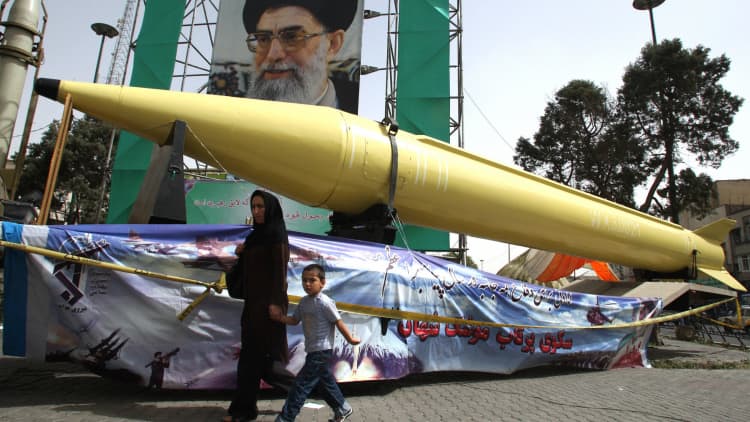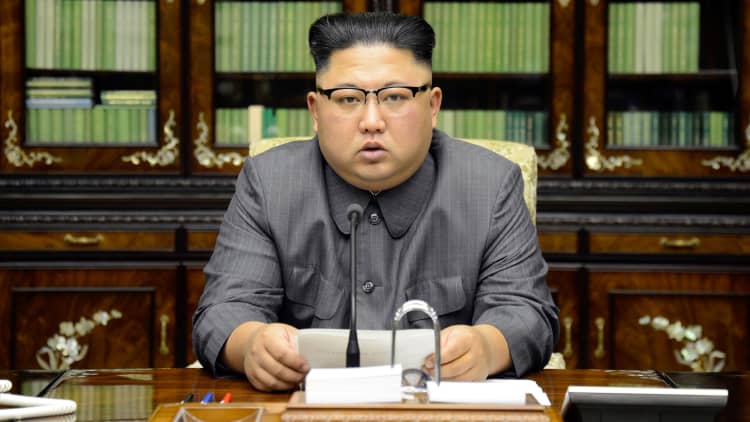
President Donald Trump's decision to overhaul America's policy with Iran raises a lot of questions for companies that have been trying to make inroads to do business in Iran.
The Trump administration on Friday laid out a new Iran strategy in an effort to "strengthen" the 2015 nuclear deal.
The Iran deal lifted sanctions on the country in exchange for limits on Tehran's nuclear program. Its enactment in early 2016 reopened the country's stock and bond markets; its channels for exports like crude oil, pistachios and carpets; and the process for large companies to apply to do business there.
When asked by CNBC about companies that have applications in the pipeline, Secretary of State Rex Tillerson said the administration's move "should not have any effect on that."
At least 18 multinational companies have lobbied Congress in favor of policies that place fewer restrictions on business in Iran and lobbied against those policies that introduce more obstacles, according to the OpenSecrets database.
The existing deal precludes companies from using U.S. dollars or funds that pass through U.S. banks to do business tied to Iran. That prevents many U.S. and multinational companies from doing business in Iran, but that hasn't stopped them from pushing for access.
The lead-up to the 2015 Iran deal saw lobbying efforts on behalf of AK Steel, Time Warner, Citigroup and MasterCard. MasterCard CEO Ajay Banga told investors around the time the deal was enacted that he hoped to have access to Iran in 5 to 10 years.
"There has to be a whole change in the sanctions regime that allows companies like us… to operate freely in Iran," Banga said in January 2016. "But until the sanctions actually get lifted, this is all very nice, but we can't do very much."
In June, Congress passed a new law to place tighter sanctions on financial institutions or foreign companies that are seen assisting Iran's ballistic missile program. The measure saw broad bipartisan support in both the House of Representatives and the Senate, but companies looking to gain access to the market lobbied against it. Among those companies: Industrial and defense companies Caterpillar, General Electric, Halliburton and Lockheed Martin, as well as energy companies like Chevron.
Exxon Mobil lobbied in favor of the 2015 Iran deal — while Tillerson served as chief executive — but did not lobby against the 2017 sanctions, according to OpenSecrets.
So far, Boeing is the only U.S. company that has been granted direct access to the Iranian market. It has a deal to sell 110 plans to two Iranian carriers for a price tag of $20 billion. That could be at risk as the administration recalibrates its approach. Treasury Secretary Steven Mnuchin said in May that the department would undergo a review of Boeing's license, as well as a license granted to Airbus, its French rival.
The chief of Brazilian airline Embraer told investors in July it is still waiting for its license to go through but is optimistic Treasury will approve its request as it did Boeing's.
"In general, it takes 9 to 11 months, as I understand, to go through the process," said Paulo Cesar de Souza e Silva, Embraer CEO.
Under the new approach announced Friday, the White House will give Treasury "broad latitude to look at additional, targeted sanctions against individuals," according to Tillerson. Over the course of the next few months, Tillerson said the U.S. would encourage its European allies to do the same.
The real wildcard is Iran's reaction to the White House's move, which represents a stiffer posture but not an outright exit from the deal. Businesses will continue to seek new opportunities in Iran, says Dan Clifton, head of policy research at Strategas Research Partners, but the country may choose to retaliate.
Companies "have to be very careful," Clifton tells CNBC. "Tensions are being heightened, and any move away from the existing agreement could lead to roadblocks for American companies by the Iranian regime."
Reuters reports the country could levy a "more crushing response," quoting lawmakers in a closed parliamentary session. Tillerson said he discussed the U.S. position with Iran's foreign minister Mohammad Javad Zarif on the margins of the UN General Assembly in September but did not disclose what its eventual decision would be.
"They can trust we'll never do a deal this weak again," Tillerson said.
—By CNBC's Kayla Tausche. Follow her on Twitter: @KaylaTausche
WATCH: The dangerous tie between North Korea and Iran


